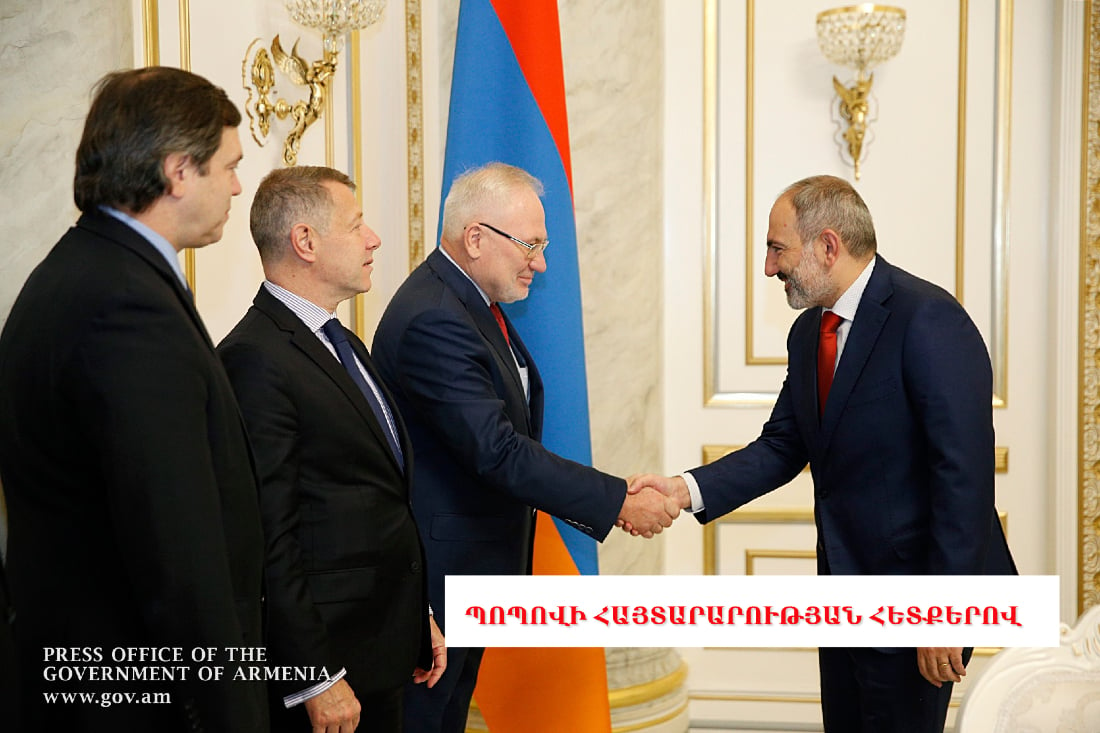On January 4, Nikol Pashinyan’s article “The Origin of the 44-Day War” was published, where the Prime Minister referred to the Artsakh negotiation process, trying to explain the reason for the origin of the war. The article mentioned that the Russian proposals envisage the return of 7 territories to Azerbaijan, without touching upon the status of Nagorno Karabakh in any way.
“The already well-known Russian proposals, which envisage the return of 7 territories to Azerbaijan by the 5 + 2 resolution, the return of refugees, and the deployment of Russian peacekeepers, were born in 2013 and were finally finalized in 2015. “The package of proposals did not address the issue of Nagorno Karabakh’s status in any way, it bypassed that issue,” Pashinyan wrote.
Days later, on January 13, the Russian Co-Chair of the OSCE Minsk Group Igor Popov referred to this part of the article in his interview, refuting the Prime Minister. “The allegations that Russia offered to return the seven regions” just like that and forget about the status “do not correspond to reality.”
Later, RA Foreign Minister Ara Ayvazyan responded to Popov. “The Prime Minister said something. Popov commented. He took what the Prime Minister wrote out of context, the Prime Minister said something else. “
The Artsakh negotiation process was conducted based on the principle of secrecy.
Some excerpts were published through unofficial channels by journalists, current or former officials and others (1 2 3). After all, we tried to understand whether there was an issue of the status of Nagorno Karabakh in the Russian proposals for the settlement of the Karabakh conflict or not, and which officials’ words are more truthful.
Russian proposals or “Lavrov plan”
Lavrov’s so-called “plan” or “document” was discussed at the end of 2015 and the beginning of 2016. Sergey Lavrov himself has denied the existence of “Lavrov’s plan” several times.
In 2016, “There is no Lavrov document. There are a number of documents, about five, prepared by the Co-Chairs at different stages of the negotiations when it came to drawing up the basic principles of the settlement.”
In 2017, “I have repeatedly stated publicly that there is no ‘Lavrov plan.’ The ideas discussed now are based on the proposals developed by the three OSCE Minsk Group co-chair countries.”
At the same time, official Moscow has stated on various occasions that the talks are based on the well-known principles voiced in the joint statements of the Presidents of Russia, the United States and France on the settlement of the Nagorno-Karabakh conflict.
“As a co-chair of the OSCE Minsk Group, our position has been repeatedly stated in joint statements by the top leadership of Russia, the United States and France. It is based on the basic principles of the Helsinki Final Act.”
What are the principles of the Helsinki Final Act?
During the presidency of Robert Kocharyan (1998-2008) the Co-Chairs presented to the conflicting parties three projects: “Common State,” “Key West,” “Madrid Principles.”
The latter was presented to the parties in Madrid in November 2007 as a basis for negotiations. Later all the parties to the conflict (Armenia, Nagorno-Karabakh, Azerbaijan) agreed to accept it. This document set out three principles of the Helsinki Accords:
- right to self-determination,
- territorial integrity,
- ruling out the use of force and the threat of force.
These were not mechanisms for resolving the issue, but principles around which they were negotiating. Official Moscow has often spoken of these principles underlying the negotiations, emphasizing their immutability (including the self-determination of the people of Nagorno-Karabakh).
What is the problem?
It is true that in its statements Russia spoke about the observance of the basic principles, the position of itself and the other co-chairs. But at the same time emphasize that the parties see the sequence of implementation of these principles differently.
Tatul Hakobyan, the coordinator of the ANI Center for Armenian Studies, who declassified the Madrid document and the working version of the Kazan document (and those declassifications were not officially denied), writes that Putin’s plan for the Karabakh settlement envisages two main packages:
- Armenian forces withdraw from five regions: Aghdam, Fizuli, Jebrail, Zangelan, Ghubatlu,
- Nagorno-Karabakh acquires a strong intermediate status, which does not presuppose a return to the territorial integrity of Azerbaijan, but also does not presuppose an independent status in the foreseeable future through the expression of will.
It turns out that the realization of Nagorno Karabakh’s right to self-determination was not really left out of Russia’s package of proposals, but the status issue was left to an uncertain future.
This view was also confirmed by Russian President Vladimir Putin during a press conference on December 17. “As for the status of Nagorno-Karabakh, it must remain unchanged, that is, it will be decided in the future.”
In Sergey Lavrov’s interview on October 14, 2020, it is noticeable that the issue of NK self-determination or status is a problem to be solved in the future.
Thus, it can be concluded that the Russian side could not but address the issue of Karabakh self-determination in the package of proposals, as the issue of self-determination was one of the three principles underlying the talks, but we understand from official Moscow statements that the issue was left to the future.
When did the negotiations reach a deadlock?
In an interview, Igor Popov also said that neither the Armenian nor the Azerbaijani sides rejected the phased settlement program. “In those proposals, it was not possible to reach a full agreement, but the main thing was the negotiations on a regular basis, until 2018 when Yerevan put forward new approaches.”
Thus, Popov indirectly blames Nikol Pashinyan’s government for the change of the negotiation logic.
Let’s try to understand what steps of the current government could contradict the logic of the negotiation process.
Pashinyan’s model of solving the problem
Nikol Pashinyan tried to put forward his own approaches to the settlement process, which were significantly different from the previous ones. To get a complete picture, we need to study the 6 points he presented, which were called the Munich Principles.
It is necessary to separate two of these points, which were regularly voiced by Nikol Pashinyan:
- Nagorno Karabakh must take part in the negotiation process, the RA Prime Minister is not authorized to present Artsakh’s point of view,
- The solution must satisfy the peoples of Armenia, Azerbaijan and Artsakh.
Russia’s foreign diplomacy has responded positively to at least one of these approaches. During his visit to Armenia for the first time after the 2018 revolution, Lavrov noted that it is clear to everyone that no agreement will be possible without the consent of the people of Nagorno Karabakh.
“Speaking about Nagorno Karabakh, I want to mention what Prime Minister Nikol Pashinyan said at our meeting today. He reminded of his public statement that the final agreements should take into account the interests of Armenia, Karabakh and Azerbaijan. It is difficult to argue with this approach.”
The contradiction between the chosen principles and the speeches
Nikol Pashinyan participated in the rally organized in Stepanakert’s Renaissance Square and announced in his speech, “Artsakh is Armenia, the end.”
At a meeting with the Armenian community in New York, former Armenian Defense Minister David Tonoyan redefined the “territories for peace” quota. “A new war against new territories.”
Arthur Vanetsyan, former head of the RA NSS, during his working visit to Artsakh, stated, “We don’t intend to give back an inch of land, but on the contrary, our compatriots must live in our lands and build our country.”
Russia’s approach to those statements was one. The statement “Karabakh is Armenia” does not contribute to the negotiation process.
The statements of the heads of the Ministry of Defense and the National Security Service received another response but from official Baku. The Azerbaijani Foreign Ministry described Tonoyan’s statement as provocative and against the efforts of the OSCE Minsk Group Co-Chairs. It is worth noting that Tonoyan said this in Vienna immediately after the meeting between Ilham Aliyev and Nikol Pashinyan, where it was announced that a peaceful atmosphere was established. Arthur Vanetsyan’s reaction also did not arrive late: The next day, the Azerbaijani Foreign Ministry called on the Minsk Group Co-Chairs to criticize the steps taken by the Armenian leadership. “… An obvious attempt is being made to thwart the negotiation process and challenge the activities of the mediators. The whole responsibility for such provocative statements falls on Armenia.”
Thus, the statements of the RA Government were not in line with the logic of the negotiations and the principles underlying them.
Ophelia Simonyan







